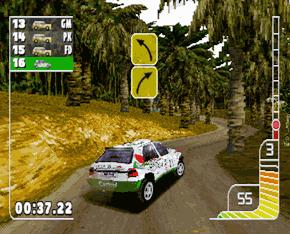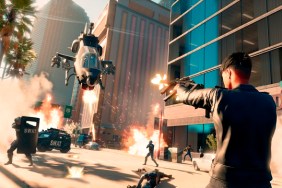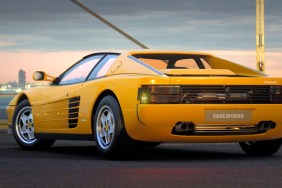McKinda Cool
Colin McRae Rally. Three words which, when put together, are entirely insignificant
to the American ear. Obviously, some poor fiend, for his last foul act before
he was fired, decided to give this game the name of a European rally driver, in
the hopes that the game would go un-noticed by American audiences, and, as a result,
would be a total flop. But this puppet of the dark lord has failed. Through the
obscure cloud of a meaningless title I bring you, my sheep, the gospel, so that
you may deliver yourselves from the bland, boring wasteland that is every other
rally game ever, and into the warm folds of CMR’s muddy robe.
Having said that, lets start with the bad stuff, then move to the good.
CMR’s
graphics are pathetic. The cars are poorly defined, the backgrounds suck, and
these little white lines (which are obviously where the polygons should seamlessly
connect) have a tendency to pop up and dance all over the screen. CMR’s cars
look like Lego cars. They all have jagged edges, blurred details, and when they
crash (no matter where or how bad) only the tail lights get messed up. Hit a
tree head on: tail-light goes out. Hit a house at 117 miles per hour: both tail-lights
go out.
The backgrounds look like something from the original Ninja Gaiden;
they are all glaringly pixelated, and can’t positively be identified as containing
any specific image. The whole game is one pop-up after another, except in the
“evening” levels, which you can tell are evening levels, because everything
twenty feet in front of the car is enveloped in a fog that is strangely reminiscent
of the first Turok: Dinosaur Hunter. There
are places in the game where the player cannot distinguish the track from, well,
anything else, because everything is the same color. Such a lack of contrast
can really damage your time since you can only go about forty miles per hour
if you get off the track.
CMR’s sound is pretty bad too. There are two types of sounds in the game, and
they are: 1) Driving noises- engine sounds, ripping metal, breaking glass, etc.
2) Co-driver noises- little navigational instructions, and, based on how well
you are driving, lame little comments like “That was good,” or “Oh no,” both
of which are Scottish for “I can’t talk right now, I’m drinking." The co-driver’s
voice happens to be none other than McRae’s real-life co-driver Nicky Grist.
The co-driver is no help at all, and has a tendency to rub the nerves raw.
The directions the co-driver gives are always relative (so you never know how
soon a turn will be coming), and in many cases there are so many turns ahead
that by the time you actually come to one, Grist has been speaking of other
turns for three or four seconds. However, in some levels this little problem
is cleared up, as Grist only elects to tell the player about the big turns,
and leaves the smaller (though no less vital) turns out. Hopefully he’s more
helpful to Colin in real life. Instead of Nicky Grist, CMR could use some music.
An up-beat, catchy drivin’ tune could really facilitate the timing involved
in making some of the turns and calculations.
However, the tracks themselves are sweet. There are forty-eight tracks divided
up between eight countries (six per country, duh). Each country embodies at
least one, usually two, different types of driving. Indonesia, for example,
contains tracks made of dusty tarmac, sand, or mud, all of which require different
strategies to negotiate. Such diversity in the tracks themselves create an intense
rally experience, as the player has to adapt to driving on tarmac (goin’ about
117 mph) to mud (only safe at about 70 mph).
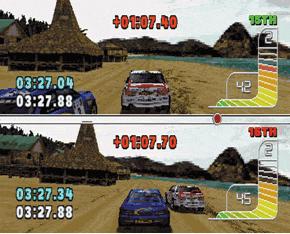 The
The
standards these tracks set for the driver are demanding, and allow for no errors.
The slightest miscalculation on a turn can cause you to catch your bumper on
an embankment or a tree, which will either spin your car wildly, or completely
wipe you out. The longer the game progresses, the narrower the tracks become.
And, with the narrow tracks comes a plethura of horrible obstacles and hazards
like logs and ditches and cliffs (oh my).
The tracks are extremely long, and a race is only one lap, so there is really
no opportunity to adjust and adapt to obstacles, hazards, or tricky turns. You
just have to be good. The tracks demand a certain level of proficiency (essentially
mastery), which, once attained, will allow the player to handle anything the
track throws at them. And then, of course, once a player has mastered a certain
track or country, they must race an entirely different track, and master an
entirely new style of driving. Being constantly shut down after one has just
recently felt so masterful can be intensely frustrating, and sometimes makes
it difficult to start a new country. However, the dynamic countries and tracks
keep the gameplay fresh all the way through the game, and the interest high
until the end of the last race.
What makes the tracks so difficult to master, and what must be understood
before a track can be beaten is the style of control particular to the given
track. There are essentially 6 driving styles in the game (which correspond
to the different types of track conditions i.e. snow, gravel, mud), all of which
depend largely upon when you brake, and how early you turn. So, in order to
deal with different track conditions you have to adapt your play style, which
takes time and can be very frustrating. But again, such variance gives the game
extra depth, and keeps the game difficult and rewarding until the final finish
line.
Colin McRae Rally rocks. In ye olde words above there be much criticism,
but keep ye in mind, that CMR’s flaws are like toilet paper on the shoe of the
sexiest high-school vixen. On a trashy, repugnant woman, such a display of sloppiness
would hardly stand out. But, in a game like CMR, toilet paper has absolutely
no place. Wait, no. Dammit. That’s not quite what I meant. At any rate, CMR
is an awesome racer that is tarnished by some sloppy design flaws. While CMR’s
flaws are irritating and seem horribly out of place, it is nevertheless an oddly
great game.
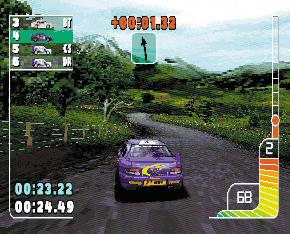
-
Creatively engineered tracks
-
Deep, rewarding game-play
-
Co-driver's a snot
-
There is no music
-
The graphics are terrible
